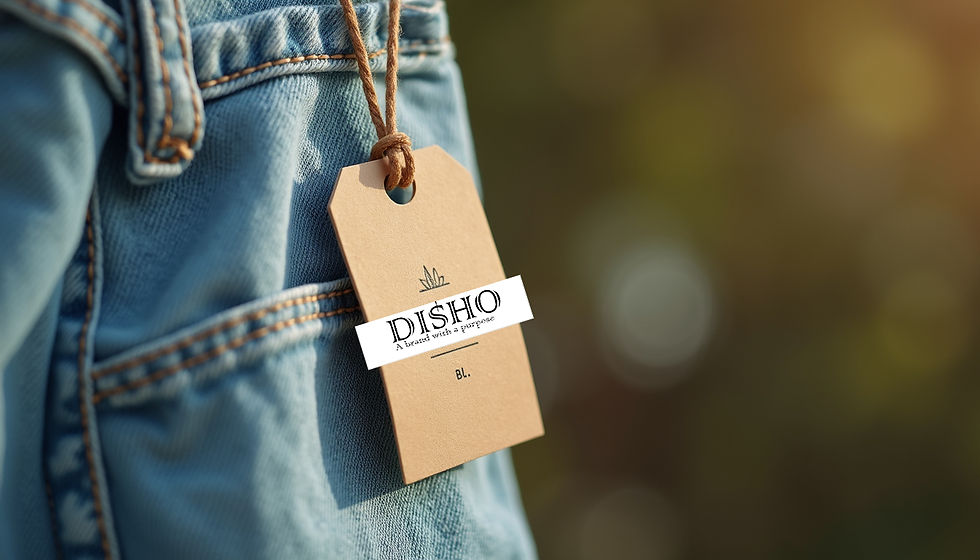Why You Should Totally Consider Buying from Disho for Eco-Friendly Living
- Shubham Chauhan
- Jul 16, 2025
- 4 min read
In today's world, where climate change and environmental degradation are pressing issues, many shoppers are eager to make responsible choices. One brand that shines in the eco-friendly arena is Disho. Committed to sustainable living, Disho offers a wide range of thoughtfully designed products that minimize environmental impact. In this post, we will explore specific reasons why you should consider Disho as your go-to source for eco-friendly goods.
1. Sustainable Materials
Disho's commitment to sustainability is evident in the materials used in their products. They primarily source organic cotton, recycled plastics, and other eco-friendly materials, ensuring that each item contributes to reducing the carbon footprint. For instance, by choosing organic cotton, Disho helps eliminate the use of harmful pesticides and chemicals, benefiting both the planet and the farmers who cultivate it.
Statistically, organic farming uses approximately 50% less energy compared to conventional methods. This commitment to sustainable sourcing supports a healthier ecosystem and encourages responsible practices in agriculture.
2. Ethical Production Process

Ethical manufacturing is at the core of Disho's operations. By partnering with manufacturers who adhere to fair labor practices, Disho ensures that workers are treated with dignity and compensated fairly. This support uplifts communities and reinforces the idea that consumer choices can directly impact lives.
Additionally, Disho shares stories of the artisans and workers behind their products, fostering a deeper connection between consumers and the people who create the products they buy. This transparency generates trust, making your purchase feel more meaningful.
3. Minimalist Design Philosophy
Disho embraces minimalism in its design philosophy. Their products are not only stylish but also highly functional and durable. For example, a Disho tote bag, designed for daily use, can last for years, reducing the need for replacements and, in turn, cutting down on waste.
By investing in well-crafted items, you contribute to a sustainable home environment. Disho’s commitment to quality over quantity encourages mindful consumption, as you buy less while fulfilling your needs.
4. Variety of Eco-Friendly Products
Disho offers a diverse range of eco-friendly products to suit various lifestyles. Whether you are in need of clothing, home goods, or personal care items, Disho has you covered. You can easily find biodegradable cleaning supplies, sustainable kitchenware, and eco-conscious apparel all in one place.
This extensive selection simplifies the transition to a sustainable lifestyle, allowing you to make eco-friendly choices without compromising on quality or style. For example, switching to Disho's eco-friendly laundry detergent can help you reduce your plastic waste significantly, as they offer concentrated formulas that require less packaging.
5. Community Engagement and Education
At Disho, community involvement goes beyond merely selling products. They actively raise awareness about sustainable living through workshops, blogs, and social media. For example, their “Eco Tips” series provides practical strategies, like how to compost at home or reduce single-use plastics, empowering consumers to make informed choices.
By connecting consumers with valuable resources, Disho fosters a vibrant community of eco-conscious individuals who impact the world around them. This educational approach transforms passive buyers into advocates for sustainability.
6. Reduced Packaging Waste
Disho strives to minimize packaging waste by using recyclable or biodegradable materials. By prioritizing sustainable packaging, they help reduce the staggering 8 million metric tons of plastic that enter oceans each year. When you shop with Disho, you can feel confident knowing that your purchases contribute to a cleaner environment.
This commitment not only benefits the planet but also aligns with your values as a conscious consumer.
7. Charitable Contributions
Disho makes giving back a priority in their business model. They allocate a portion of their profits to environmental initiatives and social organizations, amplifying the positive impact of every purchase. This commitment fosters a sense of collective responsibility among consumers, reinforcing the idea that every product sold contributes to a better world.
When you buy from Disho, you're not only gaining quality products but also playing a part in meaningful change, from planting trees to supporting clean water initiatives.
8. Cost-Effectiveness
While the upfront cost of eco-friendly products can be higher, items from Disho are designed for longevity. For instance, a Disho eco-friendly reusable water bottle can save you money in the long run by replacing countless disposable plastic bottles. Many consumers find that investing in sustainable goods often leads to 30% longer usage compared to typical store brands.
In making thoughtful purchases, you can save money over time while supporting the environment, proving that eco-friendly choices make financial sense.
Embracing a Sustainable Lifestyle
Choosing to buy from Disho represents much more than just a shopping decision. It is an investment in a lifestyle centered around sustainability, ethics, and community support. By aligning yourself with an eco-conscious brand, you contribute to the health of our planet while enjoying high-quality, stylish products.
As the demand for responsible consumerism grows, every choice you make counts. Next time you consider a purchase, think about its broader impact. Opting for Disho not only benefits your home but also enhances the quality of the planet we share.




Comments